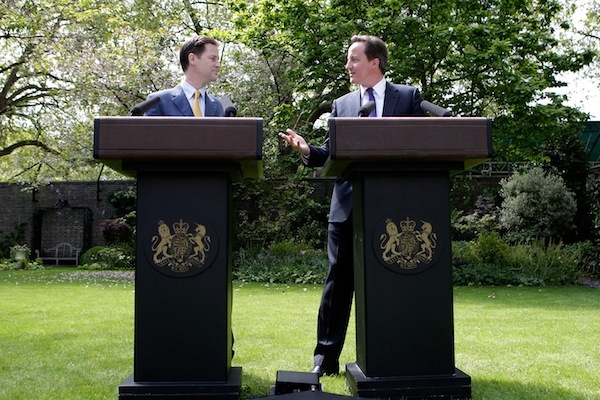The Conservatives and Liberal Democrats are preparing for their last-ditch attempt to kiss and make up before having to accept their union is over. The coalition partners are heading into the conference season with a positive attitude they hope will carry them through 2015 (and potentially beyond). A new word to describe the second coalition love-in has entered the Westminster lexicon this week — ‘proalition’.
Both sides are desperate for proalition to work. Not out of a desire to work together, but out of sheer necessity. If the coalition falls apart in the near future, both parties would face annihilation at the polls. Neither side has managed to distinguish itself significantly, nor achieved the economic growth required to return to the electorate confident of a victory.
There are also several obstacles that threaten a successful reboot of the coalition. The first is the bad blood over boundaries reform. The Tories are unwilling to let the policy go and are still trying to shoehorn the changes through. But for now, the two sides are preparing to vote in opposite directions. Whether proalition can work depends on whether the Tories can seal off boundary reforms and leave the bad blood behind. If not, the issue will remain toxic and continue to erode any trust and willingness to work together that remains. Conor Burns for one believes the ‘betrayal’ is too great to forget.
The second is Nick Clegg’s popularity as party leader. Riding off the back of Cleggmania, Clegg and Cameron’s popularity came together to usher in the era of a ‘new politics’ during the first love-in. Two and a half years later, Clegg is considered by the public to be the most unpopular party leader:
Then there are the widening policy divides. The consensus that once existed between the partners is rapidly disappearing. As Isabel reported, the Lib Dems have blocked deeper cuts to the welfare budget and have refused to sign up to a comprehensive spending review. The FT has spoken of some Lib Dems who are calling on George Osborne to change his economic strategy. This places entire purpose of the coalition under threat.
Finally, the decimated state of the Lib Dems grassroots adds extra pressure to the parliamentary party. Although the Tories have seen a drop in their membership, 1 in 5 Liberal Democrats quit the party last year. Lib Dems tend to win elections as good local MPs who fight hard and well at the grassroots level. Without that ground support, Clegg faces an even greater challenge to hold onto whatever seats he can at the election.
When David Cameron hooked up with Nick Clegg for the first season of love, they appeared to be natural partners happy to work together for the good of nation. Whether the two parties can stick together for the final furlong of this parliament will become apparent in the next few weeks.






Comments